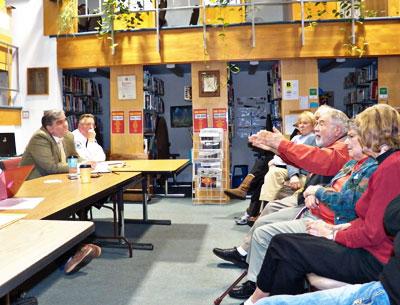Citizens Committee Covers Nuisances

John Jilnicki, the East Hampton Town attorney, told the members of the Montauk Citizens Advisory Committee and quite a few guests on Tuesday evening that the town is in the process of overhauling several provisions of the town code to make them specific to the hamlet, including the law on mass gathering permits and noise violations. “The legislation we have now is difficult for most people to understand,” he said. The committee, concerned about whether summonses have been issued for code violations, had been trying for some time to get Mr. Jilnicki to a meeting
The conversation Tuesday centered on mass-gathering permits. Members brought up a party called Shark Attack Sounds held at Rick’s Crabby Cowboy Cafe on East Lake Drive in the summer, saying the crowd exceeded by thousands the 800 people allowed under the permit.
Ben Watts, the brother of the actress Naomi Watts, and his girlfriend, Jeanann Williams, hosted the event. Ms. Williams was quoted afterward saying the police broke it up but that next year the party would be even bigger and better.
It was reported at the time that East Hampton Town police, code enforcement officers, and Montauk Fire Department emergency vehicles had trouble getting to the site because of the number of people lining the narrow two-lane road. An ambulance couldn’t respond to an emergency call, they recalled.
Dominick Stanzione, the committee’s town board liaison, said the town code now allows the town board to withhold permits from repeat offenders, including anyone who exceeds the number of people allowed or who knowingly provides inaccurate information. Mr. Jilnicki said that estimates are sought from police, sanitation, and other departments of the cost of servicing each party, and that the actual amount the town spends is often much higher. Committee members suggested that a security deposit be required for large parties. “Proprietors have to take some responsibility,” said Ray Cortell, a member.
Moving on to noise, Anne Magli of Second House Road, who lives between Ruschmeyer’s and Solé East, popular nightspots, questioned Mr. Jilnicki about those violations. She claimed that one establishment had received eight summonses for loud music and wondered at what point its music permit should have been pulled. “These people should not be given permit after permit because they don’t know how to behave themselves,” she said.
Mr. Jilnicki described the process by which notice of more than three violations would be sent to the town board. A hearing would be held and revocation of the business’s license could follow.
“But they’re not. The town is allowing this massive overcrowding and that’s what’s fueling the problem. There’s a process breakdown,” Ms. Magli said.
Members asked if data was compiled to make it easier for the town board to recognize repeat offenders. Mr. Jilnicki said that isn’t done, but he added, “It would really be helpful for the board to review that data.” Members also questioned why it took so long for violations to come up for adjudication. “That’s a problem that is not exclusive to East Hampton,” Mr. Jilnicki said, blaming the court system.
On another topic, the committee learned that the town is considering a code change that would set up a system to monitor taxi drivers and to receive complaints. If adopted, taxicab owners would be required to obtain annual licenses for their businesses and for each driver. They also would be subject to criminal background checks and fingerprinting, Mr. Jilnicki said. “This will give it some teeth.”
Ed Michels, the town’s senior harbormaster, also spoke about members’ concerns at the meeting, commenting on recent reports of contamination in Lake Montauk. Members, worrying that boaters are discharging waste even though discharge is prohibited, asked for signs to be placed at the entrance to the harbor. Mr. Michels said he had patrolled Lake Montauk for up to 20 years and had never found a boat in violation. As soon as he or the Coast Guard board a boat, the head is checked, he said. “Most people know that it is a no-discharge zone,” he said. Saying that Montauk Harbor usually sees twice the number of boats in season as Three Mile Harbor, he said 54,000 gallons of sanitary waste had been pumped out legally.
Mr. Michels said boats were being moored in the lake without a town permit and left unattended. “I don’t like boats being left alone. If they don’t see us or the cops they’re going to take advantage,” he said. The harbormaster urged committee members to call in complaints. Although it is not financially possible to have as many full-time officers as it would take to patrol every body of water all the time, he said the town had hired some part-time marine patrol officers. “But make your calls. It’s a complaint-driven process.”
